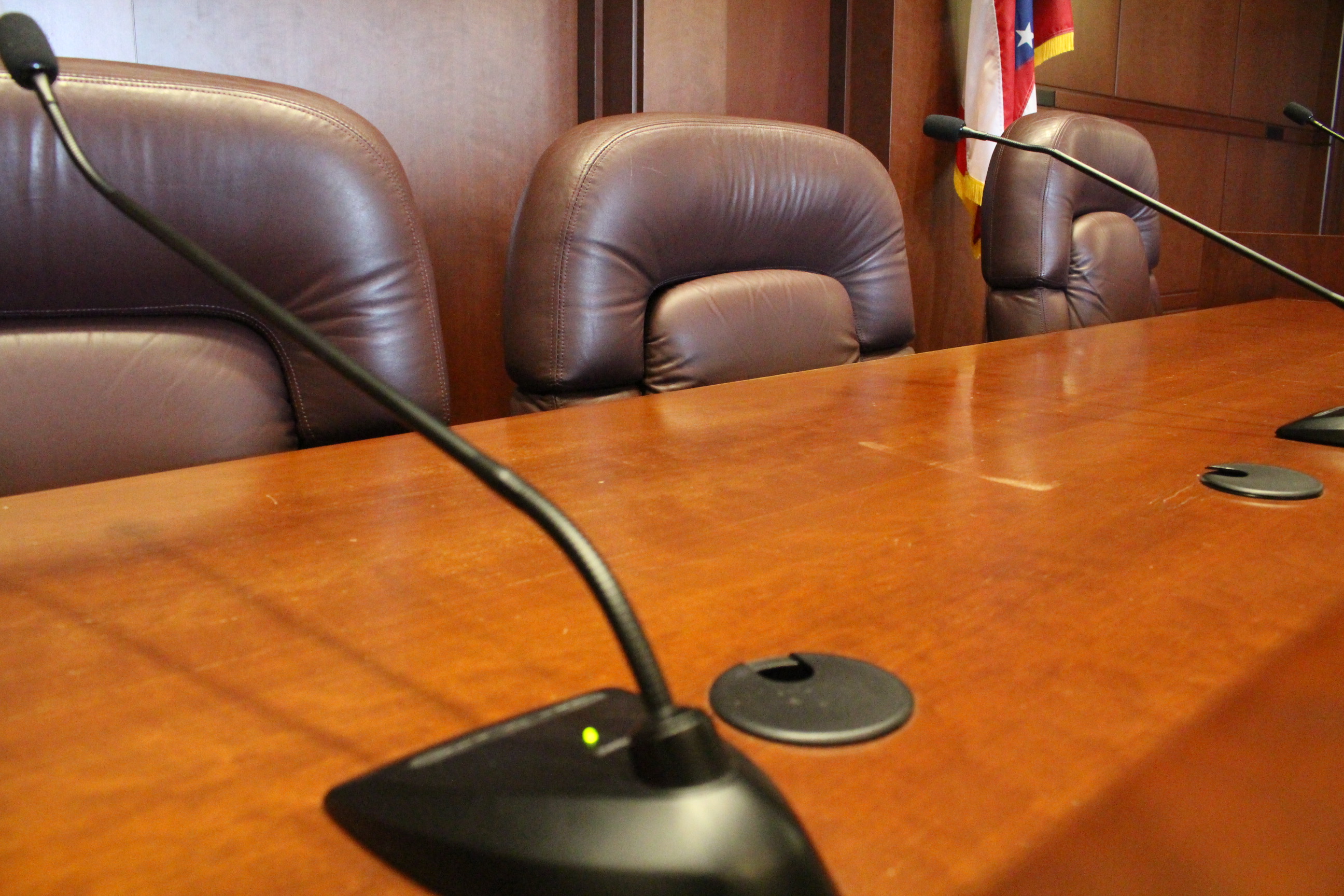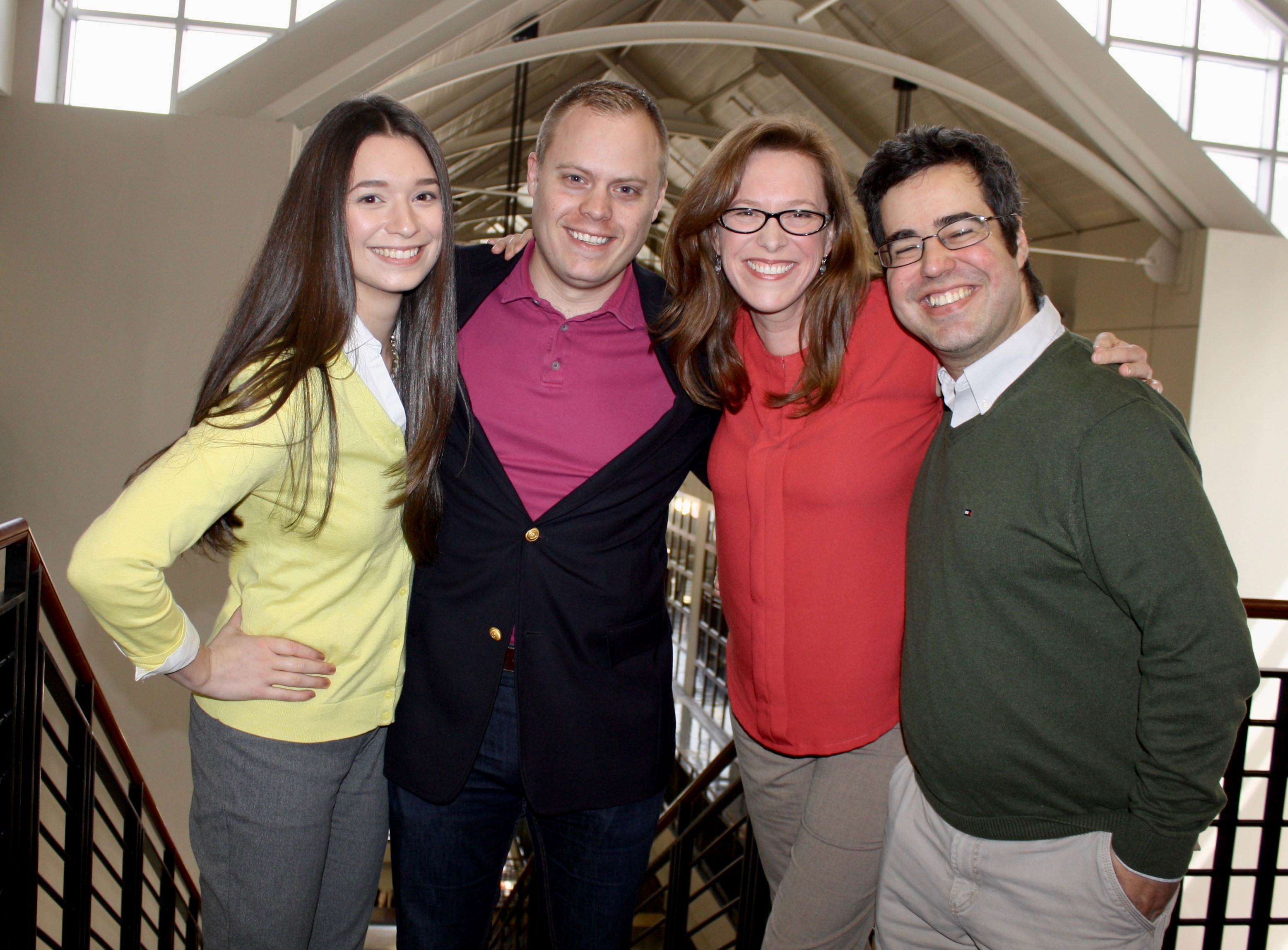Dayton Docket

Leaving A Legacy
By Lauren Karch
The inaugural cohort of the University of Dayton School of Law’s (UDSL) Leadership Honors Program will graduate in May but not without leaving a lasting impression on Dayton. This spring, the Leadership Honors Program (LHP) participants worked with community leaders to start a project aimed at addressing the region’s opioid epidemic.
Spring 2018 marked the first iteration of the Leadership Legacy Project, a final-semester project undertaken by graduating members of the LHP. As the Leadership Honors Program continues, each cohort of the program will engage in a unique community engagement project.
After reviewing a range of subject areas for their project, this cohort, a team of four students, decided to study addiction and criminal recidivism in Montgomery County. Sayre Payne, Alexandria Esposito, Andre Tirado, and Ann Charles Watts spent the spring semester meeting with civic leaders, mental health advocates, and criminal justice professionals to research the mental health and addiction services available in Montgomery County.
 “As the first cohort of the LHP, it was our job to figure out what the Legacy Project would look like,” said Andre Tirado. “We wanted to start a project that future students could choose to expand upon, and really leave this as a legacy.”
“As the first cohort of the LHP, it was our job to figure out what the Legacy Project would look like,” said Andre Tirado. “We wanted to start a project that future students could choose to expand upon, and really leave this as a legacy.”
Tirado said that all four cohort members were interested in stepping away from strictly legal studies to consider a social issue related to law, but involving non-legal work.
“Having our legal education was very helpful, but we also wanted to use critical thinking and problem-solving skills — those normal human skills — to help people,” he said.
After discussing the impact of opioid addiction in Dayton, a city known as one of the epicenters of the current drug crisis, the students chose to create a project focused on the role of the criminal justice system in responding to community needs, and to support the efforts of Montgomery County’s new mental health court.
Key contacts for the project included Julie Gentile, M.D., professor and chair of the Department of Psychiatry at the Wright State University Boonshoft School of Medicine, and Judge Gregory Singer of the Montgomery County Common Pleas Court.
Judge Singer, a UDSL alumnus and former adjunct professor for the law school, described the Legacy Project as a multi-phase venture. The research piece will, he hopes, be followed up by subsequent cohorts of the LHP interested in identifying breakdowns in the continuum of addiction care, as well as solutions to address the opioid crisis.
“This first phase was bigger than we had imaged, and the students wanted to complete it very thoroughly, as one would expect of students of this caliber,” he said. “The result has been a kind of research manual for any future legacy projects centered in the areas of mental health, covering the current scope of regional services and challenges in addressing the opioid crisis.”
The cohort researched services for individuals both in and out of the criminal justice system, and examined mental health services available to both adults and youth populations. They spoke with Montgomery County Alcohol, Drug Addiction & Mental Health Services Director Helen Jones-Kelley and Director of Treatment Judy Long, Montgomery County Commission and Sheriff’s Office officials, members of the state legislature and clinicians working in the area of mental health, eventually presenting their findings to these and other stakeholders.
Gentile says the natural link between the criminal justice system and the mental health system made the LHP students well-suited to perform research on the opioid crisis.
“The treatment system and justice system are so intertwined, the goals of drug treatment often directly include the reduction of criminal activity,” Gentile said. “Forensic psychiatry involves individuals who interface with the mental health and justice systems, so this project was a natural link for us.”
The Montgomery County Common Pleas Court was the first court in Ohio to have a specialized addiction docket; the court now has a specialized mental health docket, men’s and women’s therapeutic courts, and a specialized docket focused on veterans suffering from mental health and addiction issues.
Singer noted that, in his years working at the Common Pleas Court, he’s found nearly all people suffering from addiction have experienced some form of trauma that has lasting effects on the individual’s functioning and mental, physical, social, emotional or spiritual well-being
“In the 21st century, mental health and its more talked-about sub-issue, addiction, have an increasing role in the criminal justice system, and there is a corresponding responsibility for people within the legal profession to understand these issues. These populations are stigmatized in our culture. It’s time we learn to value our fellow humans and get past the idea that addicts did this to themselves,” he said.
Gentile says she hopes to continue to work with UDSL students in the future to research ways to improve mental health and addiction services.
“Every successful pursuit involves linking people with resources and open lines of communication,” Gentile said. “The Legacy Project highlights the intersection of the legal system and behavioral health.”
Tirado says the current cohort met with the new LHP cohort last month, and has received interest from both students and stakeholders in the community in continuing the Legacy Project research.
“From a legacy standpoint, I felt gratified that people were interested and wanted to be more engaged,” said Tirado.
Post-graduation, Tirado will work full-time as a re-entry coordinator for Clark County’s Opportunities for Individual Change, helping people with past offenses re-enter the community. He says that working on the Legacy Project increased his motivation for this type of work.
“Judge Singer often pointed out that, while we’re trained to be lawyers, we can be impactful doing work that doesn’t relate to a law or statute,” Tirado said. “Looking at what really affects people and what the community needs — that’s important work.”
